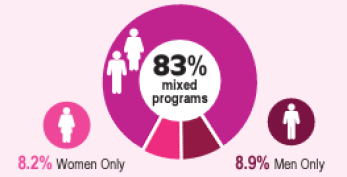

Applying interventions designed to reduce and manage the symptoms of substance use disorders.
The Substance Abuse and Mental Health Services Administration (SAMHSA) National Center of Excellence for Tobacco-Free Recovery Grant is now open for applications. Offering up to 5 million USD the grant can be used for a range of projects...
Workforce competencies are technical and behavioural skills that enhance the performance of addictions professionals, allowing them to better meet the needs of their clients. The Competencies for Canada's Substance Abuse Workforce is a...
Opioid agonist therapy (OAT) has been implemented for the treatment of individuals with opioid use disorders in Lebanon since 2011, but has not been evaluated yet. The aim of the study is to describe the...
This guide, developed by and for persons working in member states of the Caribbean, presents a model set of indicators to countries desiring to standardize the way that they organize, collect, and report drug-related information for their...
Mental and substance use disorders account for 18.9% of years lived with disability worldwide. A rising prevalence of mental disorders was identified in the past decade and a call for global attention to this challenge was made...
Objective: Chinese adolescents’ perceptions about tobacco control at schools are rarely researched. We explored how current antismoking strategies work in middle school environments, as well as the attitudes towards these...
Behavioural and pharmacological support for smoking cessation improves the chances of success and represents a highly cost‐effective way of preventing chronic disease and premature death. There is a large...
Diverse nicotine replacement therapy options may improve consumer usage. This study was conducted to establish the bioequivalence of a new cherry‐flavored mini lozenge with that of a currently marketed mint‐flavored mini lozenge...
To evaluate costs, effects and cost‐effectiveness of increased reach of specific smoking cessation interventions in Germany.
A Markov‐based state transition return on investment model (EQUIPTMOD) was used to...
Mesenchymal stem cell (MSC) transplant may offer an alternative to liver transplantation in patients with end‐stage liver disease. However, its efficacy remains uncertain. MSC was performed on a 50‐year‐old male with...
Contemporary advances in addiction neuroscience have paralleled increasing interest in the ancient mental training practice of mindfulness meditation as a potential therapy for addiction. In the past decade, mindfulness-based...
First published in 2009 and updated in 2014 the Guidelines on the Management of Co-Occurring Alcohol and Other Drug and Mental Health Conditions in Alcohol and Other Drug Treatment Settings are offered in tandem with an online training...
A glossary of drug policy terminology produced by the Drug Policy Network South East Europe is now available in English and Spanish.
The Drug Policy Network South East Europe (DPNSEE) is an initiative of NGOs from the countries of South...
Applications for the Pompidou Group Prevention Prize are now open. The Pompidou Group is the Council of Europe’s drug policy cooperation platform.
The Prevention Prize is awarded to highlight excellent drug prevention projects that have...
Applications are now open for the European Health Awards. Coordinated by the European Health Forum Gastein (EHFG), the awards are offered to public health and healthcare initiatives in Europe.
The award focuses on projects disparities...
The purpose of this publication is to develop and provide basic guidelines and criteria for the development of programmes to assess standards of care in the treatment of substance abusers in the CARICOM region. This handbook is adapted from...
A study published in the International Journal of Drug Policy, Fatal and Non-Fatal Overdose among Opiate Users in South Wales: A Qualitative Study of Peer Responses, explores the behaviour of witnesses to opiate overdoses.
The research...
The second edition of the publication, International Standards on Drug Use Prevention, published by the United Nations Office on Drugs and Crime (UNODC) and the World Health Organization has been released. The document offers guidance for...
This report presents information on four types of outcomes from the four different data sources:
Two sets of US methadone clinics selected for high versus low adherence to clinical guidelines provided evidence that in everyday practice, the recommended high doses and intensive psychosocial services really do reduce substance use and...
Share the Knowledge: ISSUP members can post in the Knowledge Share – Sign in or become a member